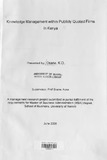| dc.description.abstract | Business environments put premium on continuous business innovation to deliver
sustainable and competitively viable customer value propositions. Hence the design
(and use) of the knowledge management program of the firm should ensure that
adaptation and innovation of business performance outcomes occurs in alignment with
changing dynamics of business environment to prevent the value these enterprises
create and the value demanded by the changing market conditions, customer
preferences, competitive offerings, changing business models, industry and structures
and shareholders
The findings on how publicly listed firms in Kenya are creating, using and protecting
knowledge to create competitive advantage would be beneficial to not only the relevant
industry sectors but also to potential investors and stakeholders. Linking organizational
success with a successful knowledge management program resident in the firm would
give impetus to the need for developing sound knowledge management strategies.
Thus for organizations yearning for success the focus would then change to identifying
core competencies, sourcing strategy and knowledge domains, formalizing existing
knowledge, representing corporate memory in knowledge repositories, sharing
knowledge in the organization and working with virtual teams, creative thinking,
intellectual property management and developing and marketing new knowledge -
based services.
The value of knowledge results from the way in which it is used in the firm's processes in
the production of products and services, and firms can build their competitive advantage
by using the capabilities that arise from knowledge assets in ways which are difficult for
others to imitate or replicate, as well as the intellectual property associated with the
assets. The management of intangible assets, particularly individual and organizational
knowledge can be extremely challenging due to the inherent difficulties in articulating,
understanding, developing and transferring them. This study will attempt to establish the
level of awareness of knowledge management in publicly quoted firms in Kenya. It will
also endeavor to establish the existence of knowledge management systems in these
firms. | en |

